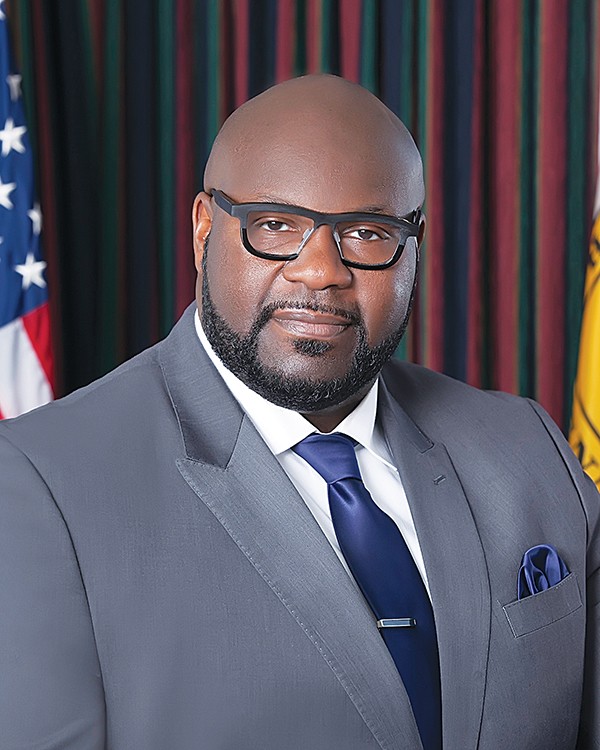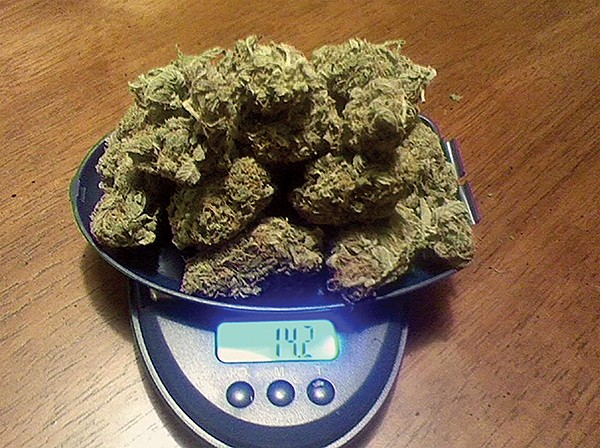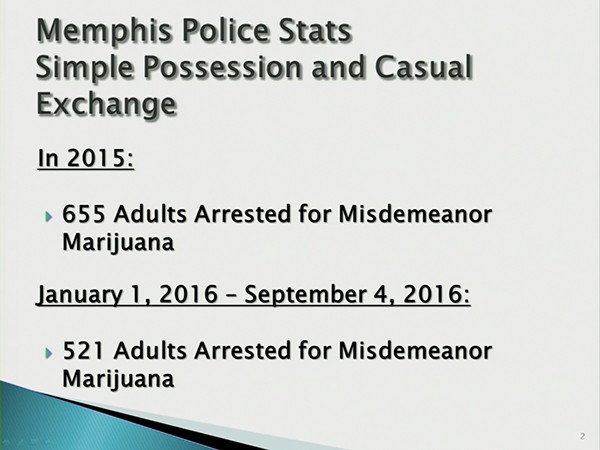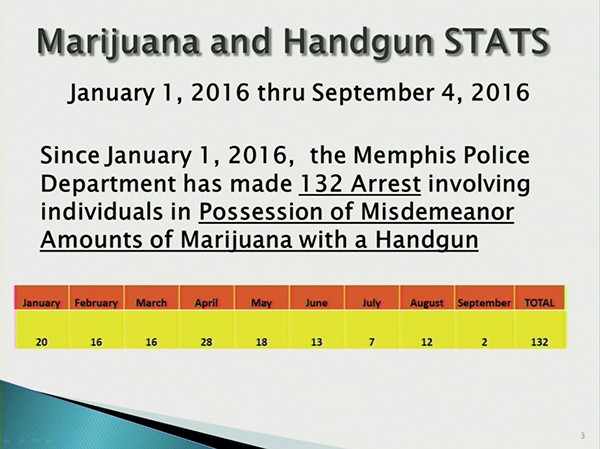Marijuana had smoldered in the minds of Memphis City Council members for six weeks, and, with the dramatic final vote only minutes away, Berlin Boyd had one last push to make his case.
Boyd wanted to soften city penalties for the simple possession of marijuana. It was the highest-profile piece of legislation he’d ever brought to City Hall. It had gained the attention of lawmakers, law enforcement officials, and marijuana advocates from across the state and beyond. And, without a doubt, they were all watching the council meeting, and especially watching Boyd that Tuesday night.
Boyd’s mic went hot, and he began to speak. It was his last shot. If he was going to change some minds, he needed some magic, some blow-your-mind evidence, and some shut-you-down logic.

Berlin Boyd
“A person high on marijuana is in a chill mode,” Boyd said. “But a person that’s drunk with alcohol, they’re very belligerent and want to talk all over you and slob everywhere over you, and that’s not cool.”
No, it didn’t remind anyone of Ronald Reagan’s “shining city on the hill” rhetorical moment. And, to be fair, it was only a part of the argument Boyd delivered that night. But it’s what he said in the final moments before the vote.
And it worked. In true Memphis style, it worked. In truth, though, Boyd did not need to win hearts and minds on weed that afternoon. The votes, it seemed, were in.
Boyd’s “chill mode” moment capped six weeks of what was at times a funny (sometimes odd) marijuana debate, rife with jokes about the munchies and not inhaling (à la Bill Clinton). But the debate was also sober, even somber at times.
Council members would sit silently with their eyes cast downward, acknowledging the massive disparity between African Americans and whites arrested for marijuana in Memphis. These facts are undisputed, the silence said, and this is a system we’ve allowed — and need to change.
Changing that system was at the heart of Boyd’s motives. He’d repeatedly stated (as he did before the final vote) that lowering marijuana charges wasn’t about marijuana at all, but about helping to break the chain of poverty for African Americans in a city that is predominately African-American.
New Law in Town
The council passed Boyd’s ordinance — which was later co-sponsored by council member Martavius Jones — by the slimmest of margins: seven for; six against. The vote breakdown was not along the traditional racial or district lines often seen in council votes.
Those voting for the ordinance pushed the need to do something different to aid African Americans in Memphis, to level economic disparities, and help keep them out of the criminal-justice-system quagmire.
Those opposed questioned the details of the rule’s implementation, questioned if the city had a right to set such a law, and seemed influenced by local law enforcement officials, who were wary of the rule’s effects on the streets of Memphis.
Here’s what the new law does and doesn’t do (h/t to council Chairman Kemp Conrad):
• It gives Memphis Police Department (MPD) officers two choices when they catch someone in possession of a half ounce or less of marijuana or paraphernalia.

14.2 grams of the sticky-icky, ganja, herb, Mary Jane, or, in short, weed
• They can issue a $50 city fine, which is like a traffic ticket and comes with no criminal record.
• Or they can go with the current state charge, which is a Class A misdemeanor that comes with a maximum $2,500 fine, up to a year in prison, and a mark on your criminal record.
• City Court judges can waive the $50 fine and instead require community service.
• The law does not impact minors.
• The law does not change D.U.I. laws.
• It does not prevent employers or landlords from drug testing and/or prohibiting drug use on their properties.
• MPD will report annually the number of $50 fines issued for pot possession versus the state’s misdemeanor charge. That report will break down those charges by race and gender.
Don’t Be ‘Ignorant’
The big question now is: Can you smoke dope openly in front of Memphis police? Thankfully, council member Janis Fullilove gave us a totally nuanced breakdown of the question before the vote last week.
“We’re talking about an ordinance that some people in this city believe they will have free rein to walk up in front of a police officer, take a hit off a joint, and say, ‘now you can’t do a doggone thing to me’,” Fullilove said to a smattering of laughter. “You are laughing but … we have some ignorant people in our city. When I say ‘ignorant,’ I don’t mean it degradingly. That they just don’t know. Because they have not listened long enough or been instructed long enough that this is not what this ordinance is about.”
Here is the straight dope (heh) from MPD director Michael Rallings: “Marijuana is not legal in the state of Tennessee; it is not legal in the city of Memphis,” Rallings said in a MPD Facebook video released after Tuesday’s vote. “If you are found in possession of less than a half ounce [of marijuana], it is still a violation of the law.”
Last year, 655 adults were arrested by the MPD on misdemeanor marijuana charges. From January 1st to September 4th this year, 521 adults were arrested on the same charges. In Shelby County last year, about 3,800 people were arrested for possessing less than a half ounce of marijuana, according to numbers from Conrad.
Those same numbers revealed that nearly 90 percent of those arrested for misdemeanor weed in Shelby County were black. The American Civil Liberties Union (ACLU) says blacks in the Memphis area are 4.2 times as likely to be arrested for marijuana possession as a white person, though the two groups use marijuana at comparable rates.
“For too long, thousands of Memphians have been arrested for possession of tiny amounts of marijuana — leading to disastrous consequences for their lives, including the loss of jobs, education, and housing opportunities,” Hedy Weinberg, executive director of the ACLU of Tennessee, said in a letter before the final marijuana vote here. “Make no mistake — this is an issue of racial justice.”
Council member Patrice Robinson said she did not support drug use, but she supported “doing the right thing.” In her case, that meant voting for the weed ordinance. “We know that there is a disparity between African-American and white males, especially with this issue,” she said. “We no longer can continue doing the exact same thing that we’ve been doing in the past to create a new reality. That does not work.”
Decriminalization?
Proponents of the ordinance argued the new rule was not as much about marijuana legalization, as it was about criminal justice. Council member Worth Morgan said it wasn’t about decriminalization. But most news headlines that were posted after the vote included that word.
However the definition of “decriminalization” from the Marijuana Policy Project (MPP) and the National Organization for the Reform of Marijuana Laws (NORML) goes beyond the Memphis ordinance to mean, basically, no penalty for possession of marijuana.
No matter what you label it, the new ordinance is a type of criminal justice reform. Josh Spickler, executive director of Just City, said the new rule is a very small reform, one that likely won’t give rise to the sweeping changes his nonprofit, criminal reform advocacy group would like to see. But it’s at least a recognition, said Spickler, that there is “disproportionate policing” in Memphis for marijuana possession.
“So, in a time when we’ve had a Black Lives Matter protest shut down the (Hernando-DeSoto Bridge) in Memphis, this is a recognition of one of the reasons why that segment of the population is so frustrated,” Spickler said. “Young men of color are targeted and are vastly over-represented in our courts.”
While Spickler was hesitant to say the move will make a large difference, he did call it, “a step in the right direction.”
But will it really help?
Not much, according to Shelby County District Attorney General Amy Weirich.
Reform proponents said lowering charges would also help clean up court dockets and, perhaps, lower jail populations. But Weirich said of the 3,800 arrested in the county on pot charges last year, only about 300 faced prosecution by her office.
“So, the notion that there are thousands and thousands of people in custody on misdemeanor marijuana charges is false,” she said.
Spickler agreed. Though, he pointed out, marijuana charges are often piled on top of a litany of other charges, such as a broken taillight, too-dark window tint, or other offenses. MPD officials said other offenses often include handgun possession. The marijuana charges help send people to 201 Poplar or pile up their charges.
Next Steps
Director Rallings said he would not allow his officers to issue city citations on simple possession until he has cleared an implementation strategy with the Memphis City Court Clerk and city prosecutors. He did not offer a timeline for the process. But he noted in a Facebook video that no city citations will be issued until after the minutes of last week’s meeting are approved by council next week. Then, he said, Memphis Mayor Jim Strickland has 10 days to sign those minutes.
So, it would be wise to wait for the final word before you go out ridin’ dirty. However, when those citations are ready to go, MPD officers will have a choice: the arrest on state charges or issue a city ticket. So, who gets what, and might that not lead to a different of type disparity?
MPD spokesman Louis Brownlee refused to offer any details on what factors will inform an officer’s decision to charge individual violators. When asked how they will decide, Brownlee only wrote, “It’s the officer’s discretion.”
This is one of the problems with the new rule, said Bill Gibbons, the former Shelby County district attorney general and former head of the Tennessee Department of Safety and Homeland Security who is now president of the Shelby County Crime Commission.
“If it’s left up to the individual officer to make that decision, arguably, you can see a serious disparity in terms of how individuals are treated, based on who the officer is and what part of town it’s in. And that can create a whole new set of problems,” Gibbons said. “Is that officer going to cite someone under state law, which means it’s a misdemeanor? Or, is he going to cite someone under the ordinance, which means it’s not. That could create some serious disparities.”
This is why Boyd tweaked his original ordinance to include that an annual report be delivered to the council. It will show if MPD officers gave more state charges to African Americans, and/or whether they were more lenient when dealing with whites and other ethnicities. Nashville Metro Council members, who passed a similar weed ordinance two weeks before Memphis did, are now attempting to include a similar report to go with their legislation.


Meanwhile, in Neighboring States …
Memphis borders Mississippi and Arkansas. That means that those living here are dealing with three states — and three different sets of marijuana laws.
In Mississippi, possessing 30 grams or less carries no charge or jail time, with a maximum fine of $250 for a first offense. The punishment gets a little steeper for the second and third offenses, with fines capping at $500, and the possibility of serving from five days to six months in prison.
Though possession of a small amount of marijuana is basically decriminalized, the distribution of marijuana is still illegal and categorized as a felony. Being caught with the smallest amount deemed to have been packaged for sale will earn you three years in jail at a minimum, as well as $3,000 in fines.
In Mississippi’s 2016 legislative season, state Representative Joel Bomgar filed a bill that would have allowed seriously or terminally ill patients access to medical marijuana. Despite being filed by a Republican in a red state, the bill didn’t make it out of the committee. However, it’s not unusual for medical marijuana efforts to take years to pass at the state level.
Things appear to be moving considerably faster in Arkansas. The Natural State will have two medical marijuana measures on the November 8th ballot. If both measures pass, the measure receiving the most “yes” votes will become law.
Though similar in that both measures will mean some form of marijuana legalization, the two initiatives differ when it comes to whom they impact, said Melissa Fults, an organizer with Arkansans for Compassionate Care, the organization that’s pushing for the Arkansas Medical Cannabis Act (AMCA). “Our [measure] is designed to protect patients, and not use patients to get rich,” Fults said. AMCA will allow some patients to grow up to six plants for personal use. Fults claimed that the competing measure, the Arkansas Medical Marijuana Amendment (AMMA), has language designed to protect would-be profiteers, who could begin selling medical marijuana.
The key difference between the two measures lies in who can grow and sell pot. Under AMMA, personal cultivation would not be allowed, and there would be no cap on patient fees. So access to needed medical marijuana would be limited to dispensaries that, like any business, could charge whatever amount they wanted.
“I would never tell anybody not to vote for anything, but we do want folks to read up on the language of Issue 6 (AMMA),” explained Fults. “Theirs is designed for people to make money, ours is designed to protect patients and their families who need this medicine,” Fults said.
The AMMA measure will put Arkansas more in line with states that have legalized medical marijuana via dispensaries, such California.
It’s possible that neither measure will pass come November 8th, but Fults — as do many others in Arkansas — believes one of the two measures will become law. Should that happen, legal marijuana will be available for sale just across the Mississippi from Memphis. Kind of like fireworks.
“If Arkansas were to legalize medical marijuana before Tennessee, I think you’d see something like what happened in the 1990s before Tennessee liberalized its beer laws,” Scott Banbury, a local environmental activist, said.
“You couldn’t buy most craft beers in Tennessee. Due to restrictions on alcohol content, you could only buy weak domestic beer in convenience stores and high-gravity beers in liquor stores.”
It was not uncommon 20 years ago for Memphians to drive to West Memphis for beer because of the variety of brews that were available. Tennessee’s strict beer laws and keg-size limits prevented state residents from buying beer that wasn’t produced by large, corporate-owned breweries such as Anheuser-Busch and Miller.
Will the same dynamic happen with marijuana? There’s little doubt that it will. Memphis would be by far the largest potential market for legal pot in the Mid-South.
Arkansas residency would be required to access medical marijuana regardless of which measure, if either, is passed. Potentially, residents of the surrounding states could relocate to Arkansas to gain access, or create other end-around moves, such as fake IDs, to “prove” Arkansas residency. According to Banbury, that creates “a serious social and economic injustice.”
“Folks that can afford to go to Arkansas, visit a doctor, and get a prescription, will, and they’ll leave their tax money in Arkansas,” Banbury said. “Other people, with no transportation, or unable to afford the costs of getting a prescription, will be left to the black market in Memphis.”
Needless to say, a lot of people will be watching and waiting to see what happens when the smoke clears on November 8th.
 Greg Cravens
Greg Cravens